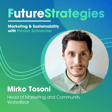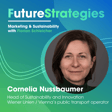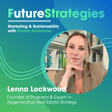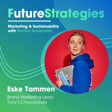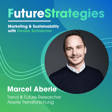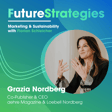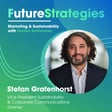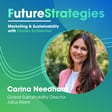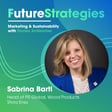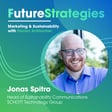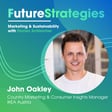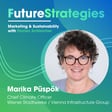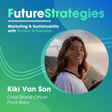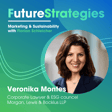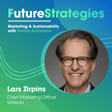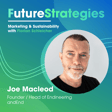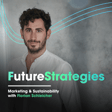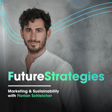Introduction to Future Strategies Podcast
00:00:00
Speaker
If you want something to be done in a good manner, you really need to make people understand. If you talk to farmers, you make them understand what the project is about.
00:00:12
Speaker
And if you make them part of the solution, start working. Welcome to the Future Strategies Podcast. My name is Florian Schleicher. I'm a marketing strategist focused on sustainability. And I'm your host here.
00:00:25
Speaker
Every two weeks, you can listen to my interviews with international
Florian's Global Work in Sustainability
00:00:29
Speaker
experts. And together, we will explore where marketing strategies and sustainability intersect with great examples, insightful stories and a look behind the scenes of some amazing brands.
00:00:41
Speaker
If you're curious how to apply all of that for your own business, I do this for my clients from all around the world through inspiring workshops, guiding mentorings and an exciting on online academy.
00:00:52
Speaker
But more on that at the end of this episode.
Introducing Gerrit Wöhrler and Wöhrler's Sustainability
00:00:54
Speaker
Now let's jump into today's interview. My guest today is Gerrit Wöhrler, CEO of the fifth generation family-owned cheese company Wöhrler.
00:01:06
Speaker
Based in Austria, they are known for much more than just cheese. they've quietly been building an ambitious sustainability program within the food industry. From CO2 reduction in dairy farming to biodiversity projects on local fields, there's a lot going on behind the scenes.
00:01:24
Speaker
So I'm very excited to unpack some of that today and really to understand what also drives his commitment to the impact that they have and why sustainability plays such a personal role.
Wöhrler's Long-term Sustainable Business Approach
00:01:38
Speaker
without further ado, welcome to the show, Gerd. Thank you for having me. Sure. So as I just mentioned, you are the fifth generation leading a traditional family company.
00:01:50
Speaker
So I would be also curious, what was the moment when you realized we need to make sustainability one core part of our identity? I think we always had a long-term view. i think even the generations before me, they had a sustainable view on making business.
00:02:08
Speaker
think it's kind of a ah value that was transported or transferred from generation to generation, even though sustainability was nods not the word created at that time.
00:02:21
Speaker
the Do you know where the term sustainability actually comes from? yeah So it comes from forest management, because in forest management, you can only fell so many trees until there are none left and that your business collapses.
00:02:37
Speaker
It actually comes from taking care in a responsible way, in a sustainable way about your forest to cut down some trees, but also leave some of them for the future. Okay, so so then you could see that the this long-term approach is always, or it was always there in our company.
00:02:54
Speaker
It's something that as a family-owned business, it's not really your business. You know, you only have your decade where you do your best and take care of it.
Collaborative Low-emission Practices in Dairy Farming
00:03:03
Speaker
And a lot of and energy has been set into the the business before and hopefully afterwards too. So this is also my approach to doing your best.
00:03:14
Speaker
Yeah. I want to also start this conversation with addressing an obvious elephant in the room, which is the impact that the dairy industry has overall on climate change.
00:03:26
Speaker
So we know that the area worldwide accounts for about 3.4% of the global cost, ah global human cost greenhouse gas emissions. So instead of being defensive, some producers like your company are actually leaning more into regeneration to improve soil health or switch to low emissions feed or working with farmers and nature instead of against it.
00:03:51
Speaker
So I would be curious what your take is on what role Werler can actually play in being part of the solution. CO2 emission is a big issue and we know that our products will never be CO2 free.
00:04:07
Speaker
So it's simply not possible, but or or for my understanding or for our understanding, the whole discussion about sustainability and climate, it's not only CO2.
00:04:20
Speaker
CO2 is one part of it. But I think you have to be aware what system is behind dairy farming.
00:04:31
Speaker
So in our point of view, or or the the farmers that we are working with, they pursued farming in the most traditional form. So we have the hay milk, we call it. it's The cows only get fresh grass in summertime and dry grass in wintertime. So it's a very extensive um way of farming.
00:04:51
Speaker
And we also did some scientific work on the emission our cows are producing. And if you compare it in a European way,
Overcoming Resistance to Sustainability Projects
00:05:02
Speaker
we have a little less emission as normal dairy farms.
00:05:06
Speaker
Mm-hmm. ah But I think it's it's it's a broader view on what the farmers or also the cows can contribute to encouraging or or making or being aware of or making the the system not collapsing.
00:05:21
Speaker
yeah Also, the cows are by far the most valuable animal making us humans eating grass. So in our region, its it wouldn't be good for for planting potatoes or corn.
00:05:37
Speaker
And also, we do our best to reduce as much as we can, but being aware of that we can never be CO2-free. yeah And I think this is something that you need to be aware, but also it's not only um c two in my point of view, which is responsible for making ah system or creating a system which is also long lasting and also able for our grandchildren to to find a good and nice and healthy planet.
00:06:07
Speaker
Yeah. So I've read a little bit about your CO2 reduced milk program. And I found out that it actually reduces emissions by nearly 25% per liter, which is massive if you scale it.
00:06:23
Speaker
So I would be curious on how you actually went about to implement this. Was there any um resistance from farmers or from partners or
Communicating Sustainability Without Greenwashing
00:06:35
Speaker
was everybody on board and everybody said, okay, let's do this. Let's bring more sustainability to our farming practices.
00:06:42
Speaker
So it was what came to our mind is what do we want to or how is our approach on the CO2 topic? And we could have bought certificates somewhere in the world, ah which would have been way cheaper.
00:06:57
Speaker
um than what we are doing now. But we said, no, we want to see what we can do really in front of our door. What can we do as a company? So we really tried our best. So we're still trying our best to be as efficient as possible with having photovoltaic on our roofs, reusing energy,
00:07:17
Speaker
And the production, again, i'm trying to use as less water as possible. But what we also said, what can the farmers do or what can be done in the system that we kind of can influence?
00:07:31
Speaker
and And we said, OK, let's build a program where every farmer has the possibility to tell us projects, what he wants to do on his farm. And we have an expert team and they say okay, this is the amount of emission we can reduce.
00:07:48
Speaker
Per ton, we give them 50 euros, which is quite a good amount. And therefore, they receive money from our side if they realize the projects they have sent.
00:08:01
Speaker
And those projects can be broad range. So it can be a football dike on the roof. It can be that they have e-trucks on their farms if they plant trees.
00:08:13
Speaker
So it can be various projects and somehow it works very well. But at the beginning, they were not so happy about it because it was something new. Somehow the farmers, they they have the sentiment from time to time they like it's their fault that climate change is existing it's their fault because society is kind of always pointing a finger on farmers and in my point of view this is not the right thing to do because they do a lot of things in terms of biodiversity they do a lot of things and in terms of thinking
00:08:48
Speaker
in a long-term view. And we have found out that if you talk to them, if you make them understand what the project is about, and if you make them part of the solution,
00:09:00
Speaker
It starts working and we have a lot of projects already realized. And I think there are a lot of projects, if we were to wouldn't have supported them, the projects wouldn't have become reality.
00:09:12
Speaker
Yeah, there is so much while to unpack there. So first, I love this really collaborative approach that you didn't say to the farmers, okay, this is now what you have to do.
00:09:23
Speaker
Otherwise, we don't work with you, but really asking them for what they are willing to do, what ideas they have. So that it feels like very much on eye level. and I really like that.
00:09:36
Speaker
And the second part that you mentioned is... And I totally agree on that, that we have to shift away from playing this blame game of saying, okay, you're either green or you're bad for the environment, but we all will have to make sacrifices and we all can gain from this.
00:09:55
Speaker
And if we just say, like you said, a lot of people say, okay, farmers are the bad guys, then we're not really also using their perspective because those are the people and the generations of people that actually...
00:10:07
Speaker
provided for generations of us and, and, and, like you said, this explaining it to them, why it's important for them, because but this is also something that is probably dear to their heart because we see if the climate changes, then we'll have less harvests, maybe we'll have not that good of a harvest. We'll have dry periods, which is also not bad.
00:10:31
Speaker
Currently, it's raining outside. We're all happy because it was really dry in Vienna and in the Salzburg area. So I think showing what it means for people That's really important. And I love that you do that.
00:10:45
Speaker
Yes. And this was also what came into my mind. if it if you want something to be done in a good manner, you really need to make people understand.
00:10:56
Speaker
and same for me, for instance, if someone is telling me, you have to do it, I'm not doing it. Well, maybe I'm doing it, but I'm doing it not as good as I really want to do it. yeah and This is something that are trying to make, understand what is the benefit and also not putting it by force, but making the project to their project.
00:11:18
Speaker
And then by word of mouth, you understand that my maybe my neighbor is doing that. So I'm also trying to do that. So this is a good approach in my point of Yeah, absolutely.
00:11:30
Speaker
So that's the, let's say, internal part of sustainability. The external part is then communicating about it. And what I also see in working with both big companies and and smaller companies it does is that a lot of companies actually have a challenge in communicating their sustainability approach and their work without sounding either greenwash,
00:11:54
Speaker
or too complex because in the end, it's a complex issue. How do you approach the challenge of communicating your sustainability efforts and what you're doing at Valle?
00:12:05
Speaker
We are trying to be as transparent as possible. So we have another, we call it Lighthouse Project. Now a sustainability program is biodiversity.
00:12:16
Speaker
But we are trying to give biodiversity more space in our region. And every area that we are giving back to, or every ground that we are giving back to the biodiversity, it's checked with scientific.
00:12:31
Speaker
And you can see it online. Where are those areas? How big they are? How are they done? And I think it's very important to be transparent and also talk about things that are not working. Because it's a lot of times that you think, okay, maybe we can do this or we can do that.
00:12:47
Speaker
And then you realize, okay, it's not working. yeah And I feel that sustainability is such a big thing and everyone is talking about it. And somehow I think it's also not too easy to make people aware that it's really something good that you're doing and it's not some marketing blah, blah.
00:13:06
Speaker
Yeah. and And therefore, we are trying to be as transparent as possible. And also what we achieved that we got more than 25 sustainability awards in the past three years where we can have the proof of concept from someone else. Because it's always easy if I say, yeah, we are super...
00:13:25
Speaker
in those things. But I think it's good that people from outside kind of legitimize it, that those things that we are doing make make sense. And this is what we are trying. and And hopefully at the end, the consumer in front of the shelf need to have a really good product in terms of taste, to have a decent price.
00:13:47
Speaker
But also, I think in the future, it's so also the system behind the brand or behind the product. where the consumer is kind of supporting them. If you buy the product, also system behind the product, ah which makes it different for the future.
00:14:02
Speaker
Yeah, you touched upon one very important aspect, which
Cross-sector Collaboration for Sustainable Solutions
00:14:06
Speaker
I think is people are per se not buying things because they are sustainable. They are buying it because of taste.
00:14:16
Speaker
When we talk about food, they are buying it because of style. When we talk about clothes, And they are definitely driven by price. So what I see whenever I work with companies is that especially companies that are but have a sustainably focused business model are often too much talking about sustainability and thereby not addressing the real needs of people.
00:14:40
Speaker
Because people, if you think of the Maslow hierarchy of needs, um It's about security. It's about feeling safe. It's about those basic needs.
00:14:51
Speaker
Like I want to look good. I want to eat healthy and so on. And then sustainability is really at the top because that's something that doesn't directly impact us. So I think, yes, communication should still focus on the real benefits that people are actually looking for.
00:15:07
Speaker
but also have as an add-on then sustainability because we see especially that younger audiences more and more look for this. And also like employees, when they look for jobs, we see that lots of millennials actually, our generation, declines job offers if the if the values of the company don't align with their own.
00:15:28
Speaker
So it is an important part, but I also think it shouldn't be the most important part when it comes to marketing or advertising? I also think so. And I think it's something that you should be aware of. Sustainability is something that maybe it's not the most important aspect on the on the buying decision.
00:15:48
Speaker
But still, I think in the future, it will play a bigger role. And also for us as a company, it's not about the return on investment in in terms of sustainability. It's really something that we are very dependent on natural cycles, which still work because we are dependent that the farmers have a good harvest. We are dependent on having healthy cows. We are dependent on the best milk quality that we can get.
00:16:20
Speaker
And I think we need to our best in our small system to really make a difference. And this is something ah sure you need to have the possibility to afford this. And in a long term view, there should be also a return on this investment.
00:16:37
Speaker
But I think it will take some more years that those brands which really do something good there, which do something outstanding there, hopefully they then also from the market, you get the return and the payoff.
00:16:50
Speaker
I totally agree. And you know, this reminds me actually of what the head of marketing of Fuslauer, the mineral water company, told me that they don't do sustainability because they they think it's and the ethical thing, but they depend on it.
00:17:09
Speaker
This is a resource, a natural resource, water like milk is. And you have to care for the environment because that's where you get your product from. Yes. And that's also what the farmers are very aware of.
00:17:22
Speaker
And they also do their best. Yeah. So i think it's something that if you're producing natural product, you need nature to be still in the place where nature is still there and where nature is still functioning.
Reducing Food Waste and Misunderstood Labels
00:17:38
Speaker
So talking about resources, I know that Wörl is also part of the resource forum or the Resursenforum in Austria, which will have its sixth national event this May.
00:17:51
Speaker
So that's May 27th and 28th. And I think you you also will be part of the event. So just for our listeners who don't know what this event is all about, it's a hybrid event.
00:18:02
Speaker
And it brings together key stakeholders like you, Gerrit, and me. I'm also participating in a panel discussion. And the theme for this year is long life for products, people, and nature.
00:18:14
Speaker
So it's about the longevity of products. So I would be curious now, what conversations are you hoping to be part of at the Ressourcenforum?
00:18:25
Speaker
I think it's always a very interesting place where you get to know new people, where you get to know New ideas where also you can think outside of the box because we are very ah limited in our thinking because we always have this topic from our business field where we are operating.
00:18:46
Speaker
And for me, it's always very interesting to see those different approaches, to see what can we maybe involve into our thinking or also what can we contribute to others.
00:18:58
Speaker
And I feel that if something is working and if, for our instance, this approach of having everything voluntarily, being too much forced, is something that we learned. And I think it's to share this information.
00:19:14
Speaker
This kind of platform is always very good. to understand, okay what is working with other companies or in other segments, what maybe can work for us, and to have just a really open discussion about things.
00:19:27
Speaker
And I think it's the same with, for instance, shelf life discussion. I mean, I know too good to go yeah is for me a very important thing. It's it's The shelf life doesn't mean if it's expired that this product is poisoned. Exactly. care Everyone has ah sense of taste, a sense of smell.
Farmer Participation in Biodiversity Initiatives
00:19:48
Speaker
ah We can see, we can have a look, and there are so many products thrown away, but it's just an indication of at least until this date, we guarantee it's super good. But I can tell you in terms of our cheeses, if you have it even two weeks or even one month later, maybe the taste is even better. Yes, that was exactly the thing. Like when I was head of marketing at Too Good To Go, we identified that 10% of the food that is wasted comes from misunderstanding of date labels.
00:20:16
Speaker
Because people, as you said, think it's poisonous. And what I really loved about this campaign campaign when we did it was that Everybody was on board. It was producers, it was customers, it was the media. Everybody wanted to highlight it because we have, in a way, lost touch with our food that we trust the label that is printed on it more than our senses.
00:20:39
Speaker
so So this is something else I think it's very good. and and and And at the forum, you always get new information. You get a state-of-the-art discussion. And therefore, i think it's very good that such things exist.
00:20:55
Speaker
And hopefully, you come home then really motivated with with new approaches or new ideas. Yeah, because the the interesting thing and is it really brings together business leaders, farmers, scientists, policymakers, marketing people like myself, because in the end, we need everyone on board to solve this. And it's not challenging just one group can solve. And and this bringing together the perspective, learning from each other, that was also the thing why I started this podcast, to share those perspectives to see what is happening in the industry.
00:21:27
Speaker
So one of the last topics that I want to discuss with you, Gareth, is i would like to take a little bit of a look ahead. What is one sustainability challenge that you are currently tackling or that keeps you up at night or that really excites you at this moment?
00:21:45
Speaker
For me, what really excites me is our project with biodiversity. That our goal was to reach a thousand habitats within 2030.
00:21:58
Speaker
twenty thirty And we reached this last year. So within three years, where we really put a lot of effort into this project, and we reached our goal. And now we said, okay, let's make 5,000 until 2030.
00:22:14
Speaker
And I think that's where we came from. And where you see how ah skeptical also the farmers were when we said, okay, we want to do ah project for more biodiversity. they said, oh, what will be like it's another layer and another something you have to deal with. And then we could see when we did our workshops, when we did our webinars, when we did like really on the grounds, our workshops where we could teach them and tell them what to do, and that it's not about our main goal is that the cows are fed in a good manner.
00:22:52
Speaker
But there are some, like everyone has some some small parts where we can do something. And then where where you could see then how this whole thing um developed. and And we really hope that we can bring together farming an economical way, but also giving biodiversity the place that it needs. And for me, it's super nice when you get a water.
00:23:18
Speaker
Look what I have found at my field. We're so proud of this. And to bring back, so to make really the farmers proud of what they're doing and not telling them, oh, they are the ones um destroying our planet.
00:23:31
Speaker
No, it's completely different. It's the opposite. side They are doing their best. And this really makes me makes me happy.
Engaging and Emotional Sustainability Communication
00:23:40
Speaker
I think you really need to think about how ah we can provide this or maintain the situation in the future. That sounds like a big challenge. Definitely.
00:23:50
Speaker
Yes. So we're almost at the end of our conversation here. But before I go to the final three questions, I would be curious, do you have any questions for me? Yes. What do you think in the future are the main topics or the main problems we will face in this conversation about sustainability?
00:24:09
Speaker
You know, i've been I've been thinking about this a lot in the last couple of weeks. And I think it at this moment, sustainability really has an image problem. Because we see on a political level, it gets less and less important.
00:24:23
Speaker
We see that when people have less income, when they struggle economically, they don't invest that much into sustainability. And I think we have on the way somehow lost people actually to care about sustainability. When I when i started at Too Good To Go, it was the summer of 2019. That was before COVID.
00:24:47
Speaker
And back then, sustainability was the most important topic worldwide. People were taking to the streets every week and it really had this feeling, okay, we're going to move forward here and actually do something. And then things happened, COVID happened, the war happened, the economic downturn happened.
00:25:04
Speaker
And now... people become, and and we see this also in data, I just wrote about it in in a thought piece, people become more egotistical and self-centered, not because they don't care, but because they are afraid of all the changes.
00:25:18
Speaker
So what I think we need to bring back is We need to make sustainability sexy. We need to make it simple also. We need to talk about emotions, not just about facts. The facts are very important.
00:25:31
Speaker
But I love the example that you you just brought up of this farmer texting you on WhatsApp, hey, look what we've just found in our fields. Because this is not about facts. they They didn't say, hey, we just counted and we that's the number of animals that we found.
00:25:48
Speaker
But it's about, oh my God, I'm so excited to have found this little thing here. And that that's what makes me proud. So I think the era of facts... And science in sustainability, communications, I think is over.
00:26:03
Speaker
And we now need to really excite people about it, to bring emotions into it and engage them and give them a positive vision that they can attach to.
00:26:14
Speaker
And I think marketing and communications plays a huge role because if we just talk about numbers, then we'll lose people. And the more we talk about feelings, the more we'll be able to actually carry them across.
00:26:27
Speaker
I also totally agree and also to highlight the good news because somehow I have the feeling that with all this those multi-crisis that are happening in the world, I think you really need to highlight those things that are good.
00:26:44
Speaker
Yeah. And also to see, okay, maybe it's a fucked up situation, but there are some some solutions and some things are going in the and the right direction. direction. Yes, absolutely.
00:26:55
Speaker
I also totally agree that sustainability lost a little bit of the importance. But I think that it's a very abstract and very complicated topic. And I think we need to make it a little more
Future Trends in Marketing and Sustainability
00:27:11
Speaker
simple. Yes, totally.
00:27:13
Speaker
So let's move on to the final three questions. so So number one is, what is good marketing for you in three words? Honest, simple, and emotional.
00:27:26
Speaker
I love that. What is the future of marketing? Very good question. I think the future is more in having it downsized, so not only perfect Photoshopped images or movies.
00:27:42
Speaker
I think more real approaches and more storytelling and and more authentic and and easier to understand.
00:27:55
Speaker
Yeah, I can totally sign up for that. Last question. What is a book that you would like to recommend here? I would really recommend a book. It's called The 25th Last Summers. and It's a very nice book about living more in and the moment and not to think about too much on what is going on maybe in the future and the past. I think that goes straight to my reading list. Sounds like ah good stuff.
00:28:24
Speaker
So Gerrit, thank you so much for coming on the show to speaking with me. I know you have a busy schedule being the CEO
Podcast Conclusion and Call to Connect
00:28:30
Speaker
of the company. So I really appreciate you taking the time and having this conversation today.
00:28:35
Speaker
Thank you for having me. It was really a pleasure. And yes, I hope to see you soon and maybe we have a beer. Yes, likewise. Let's do that. Let's catch up soon. Thank you.
00:28:46
Speaker
Okay, thanks. Bye. And that's it for today. Thank you so much for listening. If you've enjoyed this episode, please forward it to a friend or a colleague.
00:28:56
Speaker
This would mean the world to me as I pour my heart and a lot of energy into producing this podcast with all the brilliant minds that share their perspective here. And if you are curious to use the huge potential of sustainability marketing for your own brand and you know the value that a great marketing strategy brings to really connect with your target audience, give me a call or send me a message.
00:29:20
Speaker
I'd love to get to know you and your projects. You can find me on LinkedIn, Instagram, TikTok or through my newsletter where I write in-depth thought pieces that help you build a successful and exciting marketing strategy.
00:29:35
Speaker
Again, thank you so much for listening, I really look forward to sharing more with you in the future.

